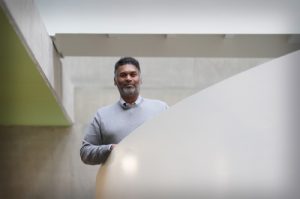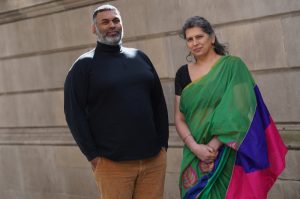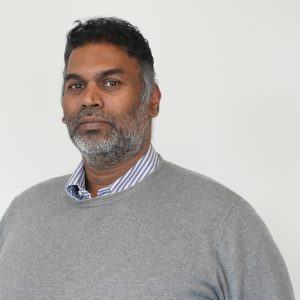
We spoke to CEO and founder of Vahanomy, Arun Gopinath and Theodor Cojoianu, Associate Professor in Sustainable Finance at the University of Edinburgh Business School about the work they did together - facilitated and funded by the AI Accelerator.

AG: During the AI Accelerator, we attended a networking roundtable event with academics from the University who were interested in climate related projects. One of the benefits of the Accelerator is that the programme team can help find potential academic collaborators and then support scoping and funding small projects. In our case, this was with Edinburgh Business School’s Centre for Business, Climate Change and Sustainability (B-CCaS), specifically with Theodor Cojoianu. After talking with Theodor, we quickly realised there was common ground for collaboration. The project was then enabled by funding through the AI Accelerator to pursue the work we needed to do.
TC: I was part of a group of academics invited to meet some of the companies taking part in the AI Accelerator within the Climate theme and found a common interest with Vahanomy. They were developing a platform to understand how to cost electric vehicle (EV) charging infrastructure for projects scaling up across the UK. At the Edinburgh Business School we work with a lot of data, both on the infrastructure finance and data science finance sides. When we put our minds together, it became clear we could help Vahanomy develop a costing model and also provide intelligence on how to attract infrastructure investors onto the platform.
AG: We're building a location-based tool to analyse and provide insights on the opportunity, suitability, viability and risk of EV charging location before installing EV infrastructure. Part of this involves looking at different financing models and how EV business models are affected by different risks. Our aim was to work with the Business School to discover and introduce these factors into our tool. We hoped our collaboration would allow us to use their expertise on infrastructure and climate projects to look at different financing models and to get our analysis validated by respected professionals and academics to make sure it was robust.
AG: We have incorporated the basic finance model into our tool to look at different risk factors and how they affect revenue generation and yield from the EV charging infrastructure. The team at the Business School helped make sure the tool was validated through external parties and we consulted with stakeholders in the EV charging infrastructure ecosystem. Working with the University opened doors for us and gave us a lot of credibility to speak with infrastructure investors, charging operators and local authorities.
TC: As a result of our collaboration, Vahanomy has been able to build a standardised but also adaptable financial model for charging infrastructure that they could offer to their clients. We created a concept for them to illustrate how it could work and they took that forward to integrate into their online platform.
TC: We learned how profitability of EV charging infrastructure projects can vary depending on the model and the involvement of the local authority, which showed us that land use is a key factor in these types of projects. We've seen both profitable opportunities as well as some loss-making business propositions that lead to profitability overall because, for instance, they generate footfall for a supermarket or shopping centre. We also learned a lot about different vehicles in the charging infrastructure - cars, buses and trucks are all very different propositions.
AG: The collaboration has helped us to gather data from stakeholders to see what kind of financial models they're using and what kind of assumptions they’re making. We now have a robust financing model and can use it to alert our customers about different risks to their business models that might arise out of changing parameters or future risk factors.
TC: As we talk about the climate crisis, it becomes apparent that tackling most environmental challenges takes collaboration and reaching out across business, academia and policy. This and other projects we’ve collaborated on have worked successfully in that regard, and depending on the sector and the application, that success can go quite far.
AG: Collaborating with the Business School through the AI Accelerator has been hugely beneficial. We always tell different founders and startups in the AI space that they should consider signing up to the Accelerator, because for us, it opens doors to many different things, whether it's connecting with investors or working with different stakeholders. It’s quite a competitive process to get in, so when people see that you're on the AI Accelerator, they take you more seriously. It's a living, breathing programme – the team looks at what each company needs and tailors support to that. We've benefited from expertise, we've benefited from contacts, introductions and validation. And it has helped us continue some relationships beyond participation in the Accelerator.
TC: Working with Vahanomy has been great. Arun is so passionate about his work and we learned a lot from each other. He knew about charging infrastructure, we knew about climate finance and sustainable data science, so sharing that knowledge was a really beneficial exchange for both parties. The programme team at the AI Accelerator were fundamental in getting this collaboration off the ground and funding the work.
AG: We hope the critical input from the team at the Business School and working with the wider University will continue to give us greater credibility with our customers. We are using a lot of predictive factors in our analysis so we need to make sure it’s really well tested. Through this collaboration we know we have worked extensively with different stakeholders and made sure that it's robustly tested.
TC: Not only have we made a trusted contact, but if there are any grant opportunities in EV charging infrastructure, we can develop more into this space to develop a transport division or transport research centre. Projects like this are brilliant for opening up new ideas for the growth of the Business School.
